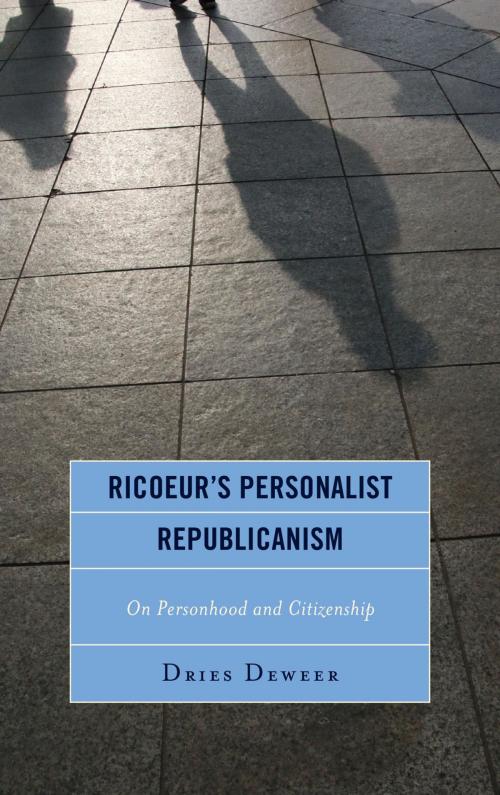Ricoeur's Personalist Republicanism
Personhood and Citizenship
Nonfiction, Religion & Spirituality, Philosophy, Political| Author: | Dries Deweer | ISBN: | 9781498552882 |
| Publisher: | Lexington Books | Publication: | August 14, 2017 |
| Imprint: | Lexington Books | Language: | English |
| Author: | Dries Deweer |
| ISBN: | 9781498552882 |
| Publisher: | Lexington Books |
| Publication: | August 14, 2017 |
| Imprint: | Lexington Books |
| Language: | English |
Moral and political convictions never stand alone. They are always connected to an underlying view of mankind. Liberalism, which currently predominates, is connected to a focus on the free individual. Marxism thinks of man in terms of class struggle, determined by economic relationships. Halfway the twentieth century a powerful alternative came about, by the name of “personalism”. This term stood for a social and political thought based on the concept of the human person. This concept stresses that a human being only becomes human in relationship with others and in a commitment to values that go beyond one’s individual interests. Although personalism has an important influence in western society, in philosophical circles it is often regarded as dead and gone. This tension brings Paul Ricoeur to the fore as an interesting interlocutor, because he was considered a representative of personalism in his younger years, while he later on also supported fatal criticisms of original personalism. This book investigates to what extent the thought of Ricoeur bears a continuing stamp of personalism that allows him to instigate a personalist perspective within contemporary political philosophy. The final result lies on three fronts. First, there is more clarity in the status of personalism in contemporary philosophy, as Ricoeur’s hermeneutical phenomenology shows that there are still viable means to elaborate the core ideas of personalism. Second, a personalist kind of republicanism is shown to provide a valuable input in the contemporary philosophical debate on citizenship. Finally, the most tangible result is a deeper understanding of the oeuvre of Ricoeur, in the sense that this book shows that personalism is an important and above all underestimated perspective to understand his entire work.
Moral and political convictions never stand alone. They are always connected to an underlying view of mankind. Liberalism, which currently predominates, is connected to a focus on the free individual. Marxism thinks of man in terms of class struggle, determined by economic relationships. Halfway the twentieth century a powerful alternative came about, by the name of “personalism”. This term stood for a social and political thought based on the concept of the human person. This concept stresses that a human being only becomes human in relationship with others and in a commitment to values that go beyond one’s individual interests. Although personalism has an important influence in western society, in philosophical circles it is often regarded as dead and gone. This tension brings Paul Ricoeur to the fore as an interesting interlocutor, because he was considered a representative of personalism in his younger years, while he later on also supported fatal criticisms of original personalism. This book investigates to what extent the thought of Ricoeur bears a continuing stamp of personalism that allows him to instigate a personalist perspective within contemporary political philosophy. The final result lies on three fronts. First, there is more clarity in the status of personalism in contemporary philosophy, as Ricoeur’s hermeneutical phenomenology shows that there are still viable means to elaborate the core ideas of personalism. Second, a personalist kind of republicanism is shown to provide a valuable input in the contemporary philosophical debate on citizenship. Finally, the most tangible result is a deeper understanding of the oeuvre of Ricoeur, in the sense that this book shows that personalism is an important and above all underestimated perspective to understand his entire work.















